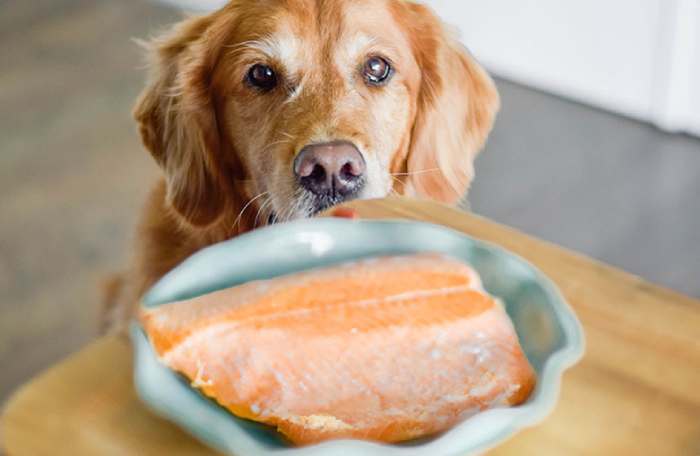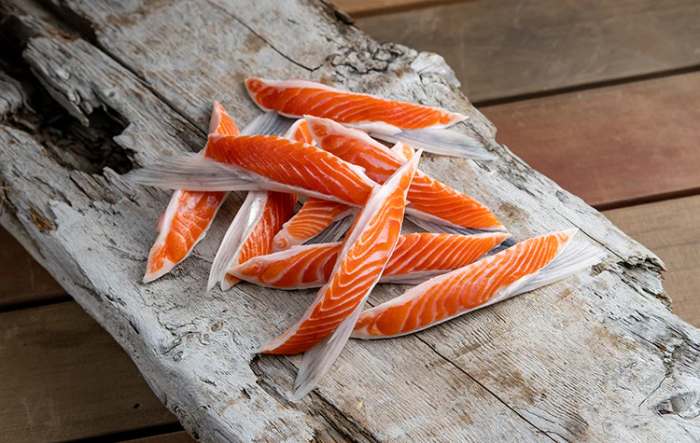Have you ever pondered the question, ‘Is salmon skin good for dogs?’ You’re not alone. Many dog owners question what’s safe and beneficial for their furry companions’ diet.
Salmon skin can be a healthy dog treat, packed with omega-3 fatty acids, protein, and essential vitamins. It supports a dog’s immune system, reduces inflammation, and promotes a shiny coat. However, it’s not without risks. Incorrect preparation could lead to health issues.
In this guide, you’ll uncover the potential benefits and risks of feeding your dog salmon skin and learn how to do it safely.
Understanding Canine Dietary Needs:
Understanding your dog’s dietary needs is crucial to ensuring they receive balanced and nutritious meals. Certain foods commonly trigger canine allergies, and identifying these is key to maintaining your pet’s health. You need to understand that a balanced diet for your dog goes beyond the conventional proteins and carbohydrates.
It should also include a good mix of vitamins, minerals, and fats. These nutrients are crucial in enhancing your dog’s immune system and ensuring healthy skin and coat.

Don’t overlook the importance of regular vet check-ups. They’ll help detect any potential food allergies early. Remember, what you feed your dog can significantly affect their health and quality of life. So, you must understand their dietary needs and provide a well-balanced diet.
Read More: Is Raw Chicken Good for Dogs?
Nutritional Value and Benefits of Salmon Skin:
Diving into the specifics, let’s examine the nutritional value of salmon skin for your four-legged friend. Salmon skin is rich in Omega-3 fats, which support a healthy coat, reduce inflammation, and aid brain development. However, the nutritional value can vary based on skin preparation methods.
- Raw salmon skin may contain parasites harmful to dogs.
- Freezing it before feeding can kill these parasites.
- Always check with your vet before feeding raw foods.
- Cooked salmon skin can be a healthier option.
- Bake or steam to maintain the most nutrients.
- Salmon skin recipes often include other beneficial ingredients.
- Avoid smoked or cured salmon skin, as it may contain harmful additives.
Potential Benefits Of Salmon Skin in Diets:
Given the nutritional richness of salmon skin, you might wonder about its potential benefits for your furry friend. Well, it’s not just tasty but also offers various health benefits.
For starters, it’s a skin-boosting ingredient. The high Omega-3 content in salmon skin helps to improve your dog’s coat, making it shinier and healthier. Omega-3 fatty acids also play a critical role in reducing inflammation and can help dogs with skin allergies.
Furthermore, these Omega-3 advantages extend to your dog’s cardiovascular health. They aid in the prevention of heart disease by reducing blood pressure and triglyceride levels.
Plus, the protein provided by salmon skin aids muscle development and energy levels.
Risks and Precautions with Feeding Dogs Salmon Skin:
While you’re relishing the benefits of salmon skin for your dog’s health, it’s crucial to consider the potential risks and necessary precautions before deciding to include it in their diet.
- Allergenic reactions: Some dogs might be allergic to salmon, leading to symptoms such as itching, swelling, or difficulty breathing.
- Toxicity concerns: Improperly cooked or raw salmon skin may carry parasites and harmful bacteria, potentially causing salmon poisoning disease (SPD).
- Precautions:
- Always cook the salmon skin thoroughly to kill any potential parasites or bacteria.
- Introduce salmon skin gradually into your dog’s diet to monitor for any allergenic reactions.
- Seek veterinary advice if you notice any unusual behavior or symptoms in your dog after feeding them salmon skin.
Best Practices for Feeding Salmon Skin:

Now that you know the potential risks, following a few best practices to ensure your dog’s health and safety when feeding salmon skin is wise.
Skin Preparation Methods:
- Always cook the salmon thoroughly to kill any harmful parasites or bacteria.
- Avoid adding spices or oils, which can upset your dog’s stomach.
Portion Sizes:
- Moderation is key when feeding salmon skin to your dog.
- Too much salmon skin can lead to weight gain and other health issues due to its high fat content.
- A small piece of skin once a week should suffice.
Observing Your Dog:
- Always observe your dog after introducing new food into their diet.
- If you notice any adverse reactions, discontinue feeding salmon skin and consult your vet.
Frequently Asked Questions:
Yes, dogs can have an allergic reaction to salmon skin. It depends on the skin preparation methods and potential salmon skin toxicity. If your dog starts displaying signs of distress, consult your vet immediately.
Yes, you can feed salmon skin to dogs with certain health conditions. However, preparing the skin properly is crucial to remove potential toxins. Remember, salmon skin’s nutrition can benefit your dog’s health.
While salmon skin’s nutritional value is high, it can’t replace your dog’s regular meals. It’s a tasty supplement, but proper preparation is crucial to avoid harmful toxins. Balance is key in your dog’s diet.
You shouldn’t feed your dog salmon skin too frequently. Although it’s packed with nutrients, moderation is key. Consider its nutritional value and ensure proper preparation to avoid hazards like parasites and high-fat content.
Yes, there are other fish skins safe for dogs. However, preparing them properly is crucial to ensure your dog’s digestive health. Try skins from smaller fish like mackerel or sardines as an alternative.
Conclusion:
In conclusion, you can give your furry friend salmon skin, but moderation is key. It’s packed with beneficial nutrients that can enhance your pup’s health. However, remember, “Too much of a good thing can be bad.”
Overfeeding can lead to health issues. Always ensure the salmon skin is thoroughly cooked and served in small amounts, free from spices. Your dog’s health is paramount, so always consult your vet before introducing new foods.

Hey there, I’m Janet Brooks, a dog-loving student from California. I’m all about helping pups in need, especially those without homes. Me and my awesome friends work together to give shelter and love to stray dogs. Oh, and I also write blogs about dogs to share helpful info.